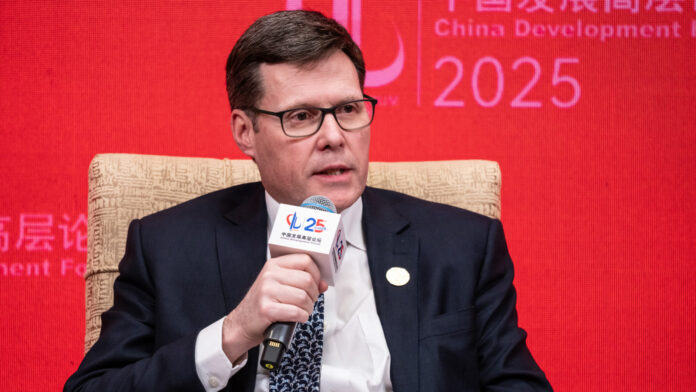
Voicemail is on the decline globally, 8% lower since 2020, according to US company Vonage. Coca-Cola removed it from its corporate headquarters three years ago. Yet for Ken MacKenzie, chair of BHP, the world’s largest miner, it was the preferred means of imparting some tasty news to his Anglo American counterpart.
No-one knows exactly what Stuart Chambers heard on April 16 last year when he picked up his messages, but you can be sure the one from Mackenzie, now retired, went something along the lines of: “We’re going to buy your company. Details to follow.” A letter confirming the $39bn tilt landed at 17 Charterhouse Street, Anglo’s UK office, soon afterwards. Cue panic.
Several weeks later, forced to go public when BHP’s all-paper takeover was leaked to the Australian press, Anglo launched its riposte — a spectacular, once-in-a-generation restructure. Duncan Wanblad, who was still finding his feet as CEO, would oversee the demerger of the group’s platinum business and the sale of its nickel and coal mines, and sever the group’s 98-year link with diamond miner De Beers.
Though hatched before BHP’s offer, Anglo’s response, combined with the complexity of BHP’s takeover plans and its surprisingly naive mismanagement of the South African government — the company failed to consult with the department of mineral & petroleum resources until the last minute — saw the Australians back off, even after adjusting their offer to $49bn, on May 22 2024.
Since then, Anglo has launched headlong into its efforts to meet its two-year restructuring timetable. “I don’t think the market expected us to progress so quickly,” says global head of corporate affairs James Wyatt-Tilby of the restructuring. Anglo American Platinum (Amplats) has been unbundled, while lucrative sale agreements have been signed for the noncore assets.
SBG Securities analyst Tim Clark says: “My sense is that Wanblad has gained quite a lot of capital.” Normally, these gains would be reflected in Anglo’s share price. However, mining company share prices, including those of Anglo, have been under huge pressure, a function of trade wars that have dampened economic prospects and company valuations.
In any event, the market prefers a financial ratio that gives investors insight into relative operational cash flow (known as enterprise value to earnings before interest, tax, depreciation and amortisation). On this basis, Anglo has performed well against its peer group. “We’re well on our way towards being rated more like a pure-play copper company than a diversified stock, which was the plan,” says Wyatt-Tilby.
UBS analyst Myles Allsop says in a note: “Anglo remains our top pick of the UK diversified miners.” The bank believes there is an attractive risk-reward ratio for copper, despite today’s parlous macroeconomics. “We expect the stock to rerate over the next 12 months as management rebuilds trust and the stock repositions as a high-quality copper equity from a diversified miner.”
But there’s a narrative that Anglo remains vulnerable to takeover. The irony is that while Wanblad’s restructuring might make Anglo leaner and more in step with investment vogue, it is also dinkier. Without a commensurate value increase, Anglo simply looks like a tasty morsel for a larger aggressor. “There’s no room for error. The blowtorch is on them,” Matthew Haupt, portfolio manager at Wilson Asset Management, said last year.
Peabody problem
For now, Anglo’s restructuring is a work in progress. One incomplete task is the sale of part of its metallurgical coal mines in Australia. Anglo said in November it had completed the two separate sales totalling $4.9bn, a sum considered above par. That was until this month, when US firm Peabody Energy raised concerns about its $3.8bn deal after an “ignition” — an event known to the rest of us as a fire — in March at Moranbah North, one of the mines it is buying from Anglo.
Anglo immediately suspended production at Moranbah North, in line with Queensland mining guidelines. A similar abundance of caution has meant the mine is yet to reopen. Grosvenor, another Anglo mine Peabody is buying, remains closed after a fire in July last year. The Moranbah North suspension has dismayed Peabody. Its CEO, James Grech, said it could represent a “material adverse change” (MAC) — legal grounds for cancelling the deal.
Anglo remains our top pick of the UK diversified miners. We expect the stock to rerate over the next 12 months as management rebuilds trust and the stock repositions as a high-quality copper equity from a diversified miner – Myles Allsop, UBS
Analysts think this could be Peabody’s way of forcing Anglo back to the negotiating table amid tumbling coal prices. Anglo, however, is not inclined to reopen negotiations with Peabody. In its view, the MAC is satisfied only when the event is unforeseeable. Queensland’s Bowen Basin coal mines are known to be “gassy” and since Peabody already operates there, it would know this. Nor does the fire imply a long-term adverse effect, another condition for an MAC, argues Anglo.
Another factor in Anglo’s favour is that the deal structure required upfront financial guarantees, which Peabody fulfilled. In other words, this is not a transaction Peabody can encase in “subject to finance” conditionality.
De Beers looms
A larger, more complex headwind for Anglo is removing De Beers, either in a trade sale — its preference — or an IPO. Here, the waters run murkier for Wanblad.
He said recently he could “get a long way down the track” with De Beers this year, but has nonetheless extended probable finalisation of the event to 2026. This is to do with the obfuscating market effects of US President Donald Trump’s on-off tariff circus.
Inflationary trade wars are pernicious to the diamond sector, which depends on discretionary spend. Unsurprisingly, prices for rough diamonds are under pressure, falling 12% in the past 52 weeks, according to independent diamond analyst Paul Zimnisky’s rough diamond price index. De Beers has resorted to selling rough diamonds for big discounts on the hoof, partly to ease the pressure of its costly (and burgeoning) inventory in Charterhouse Street.
The stockpile is a problem for Anglo. The group wrote down its 85% in De Beers by $2.9bn for its 2024 financial year, carrying the investment at $4bn. The reason was an estimated $2bn in stocks — unsold, unpolished diamonds which have lost value against their purchase cost.
This puts a trade sale of De Beers on a value knife-edge. Does Anglo sell De Beers at its carried value, risking a subsequent diamond market recovery? Happy days for the hypothetical buyer, were that the case. Were diamond prices to recover such that the inventory surged to, say, $2.5bn, it would mean Anglo had sold De Beers for only $1.5bn.
De Beers has resorted to selling rough diamonds for big discounts on the hoof, partly to ease the pressure of its costly (and burgeoning) inventory in Charterhouse Street
A buyer for De Beers will also need deep pockets to run both its capital needs and its market development, not least because it has to fend off the threat posed by synthetic or lab-grown diamonds. Prospective buyers might therefore argue De Beers needs to recapture its custodianship of the business, doubling marketing spend to $400m to do this.
According to a report by Bloomberg News, former De Beers CEOs Gareth Penny and Bruce Cleaver are both heading groups of potential purchasers, alongside Australian mining veteran Michael O’Keeffe, who ran an Australian veteran who sold coal producer Riversdale Mining to Rio Tinto Group for $3.7bn in 2011.
As for lab-grown diamonds, prices have cratered more than those of natural diamonds, yet the segment is still a threat. De Beers shut its own lab diamond business in Joburg, created to help drive a distinction in the way these diamonds are priced against mined goods — a strategy it claims is now complete.
UBS estimates Anglo will realise $4bn-$5bn for its De Beers exit. It might also be possible to structure the deal so that the brand and retail side of the business is sold separately from the upstream assets. According to Visible Alpha, a subset of ratings company S&P Global, the consensus valuation of De Beers is about $3bn. An IPO might be difficult to “get away” with in today’s market, says UBS.
One positive is that the sales process could be assisted by Botswana. A 15% shareholder in De Beers by dint of its lucrative Debswana joint venture, the country’s newly elected and business-friendly president, Duma Boko, may support his government taking a larger share, possibly up to 50%, in a newly owned De Beers. This would reduce the risk of a private sector buyer.
Anglo says interest in buying De Beers has been fierce and, serendipitously, diverse. Certainly the company is tailor-made for buyers in the Middle East and Asia. The US comprises 50% of the market. For De Beers to grow, new markets need to be opened up more fully.
Takeover blues
What does all of this mean for Anglo’s future? If its restructuring succeeds, it will foolproof the company against discounted takeovers. Perversely, unhelpful economic conditions also assist Anglo because it forces its potential predators to become introspective. Yet rumours of BHP revisiting its interest in Anglo won’t quite die down, notwithstanding the likelihood of the Australian group’s CEO, Mike Henry, stepping down this year. (New management is also due to be installed at another prospective predator, Rio Tinto.)
“BHP put its best forward,” RBC Capital Markets analyst Kaan Peker said of BHP’s takeover offer last year. “It’s not necessarily over. If Anglo American trades back to the pre-bid levels then there will be a lot of questions.”
UBS sees major synergies for BHP if a renewed bid is made. Key among them is that it will lift copper to more than 50% of ebitda from its current 35%, but the timing is critical. The copper price is expected to soar in the next two to three years while iron ore — to which BHP has major exposure — is due to fall.
BHP’s final offer before it demurred last year included 0.866 of its shares plus Anglo’s shares in Kumba Iron Ore and Amplats, which had an implied valuation of more than £31 a share, or about £23 a share at spot share prices. Anglo is now trading at £21 a share. “Could BHP make an offer for Anglo again?” asked the bank. “Yes, we think the potential likelihood increases if Anglo underperforms BHP.”
A version of this article first appeared in the Financial Mail.











